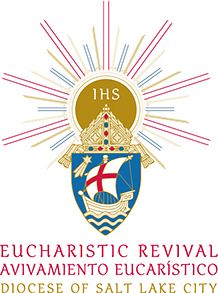Reflection 14: The Communion Rite, Part 3
(Editor’s note: This is one in a series of reflections on the importance of the Eucharist and what it means to be a Eucharistic people. These reflections are part of the Diocese of Salt Lake City’s participation in the National Eucharistic Revival, which began last year and will end in July of 2024 with the National Eucharistic Congress in Indianapolis. These reflections are designed to be read aloud at Mass by a priest, deacon or experienced minister following the Prayer after Communion. They will appear in print in this newspaper and on the diocese website, www.dioslc.org. The series of reflections will continue through next week in preparation for the July 9 Diocesan Eucharistic Rally at the Mountain America Expo Center in Sandy.)
While we kneel and silence falls over the congregation to mark yet another solemn moment of the Mass, the priest presents the Eucharist to us by saying, “Behold the Lamb of God ... who takes away the sins of the world.” What the priest presents to us in this moment is Christ in the most physical state. We are laying our eyes upon the Lamb of God prefigured in the Old Testament, recognized by John the Baptist in the Gospel, and seen in his full glory in the Book of Revelation.
The final words of the priest during the revealing of the Host is the culmination of our entire existence: “Blessed are those who are called to the Supper of the Lamb.” By presenting himself to us in the form of the Eucharist, Christ is allowing us to receive him physically, but in such a way that it is celebratory – in the form of a communal meal. The Supper of the Lamb refers to the Wedding Feast of the Lamb seen in the Book of Revelation. The Mass, the Eucharist, and our participation in it is literally a taste of Heaven.
Our response to this is reciting the words of the centurion who spoke to Christ when he needed his servant to be healed – we simply are not worthy of participating in the Eucharist, but God allows us once we have gone through the proper preparations of our hearts, our souls and our bodies.
All of this is only made possible through the Word – the Word that created the Universe, the Word that was with God and was God, the Word that healed the centurion’s servant, and the Word that came forth from the mouth of the priest acting in persona christi that changed the bread and wine into the Body and Blood of Christ.
Now, the community gets to participate in the reception of the Eucharist. This is such a profoundly serious gift that it is important that we are properly disposed and in a state of grace to receive it. The Catholic Church is incredibly open in our liturgical celebration to those who may be curious or new to the faith, but the Eucharist is not our gift to give out. Therefore, the Eucharist should require us to go through a sincere and active process of forgiveness and repentance, internal and external purification, and a true and sincere belief in the Real Presence before we receive it.
To receive Christ’s Body, we do so correctly either making a throne with the palms of our hands and then bringing the Host to our mouth or directly on our tongue. Reverence defines this action, regardless of which way it happens. What we receive in our bodies is the mystery of Christ’s own Body and Blood, joining us to all the saints and the whole Church throughout the ages.
Christ offers himself to us in the Eucharist, but again, the Mass, and the Christian life in general, is an exercise in constant reciprocation – we give to God and God gives to us. The Eucharist does not come to us – it is presented, offered to us, and made available, and we in turn make ourselves available to Christ by approaching the Altar of the Lord to receive it. If we are not able to receive the Eucharist physically, we can still participate in the community’s reception by praying to God for a Spiritual Communion.
After the distribution of the Eucharist, the priest continues his sacramental duties by intentionally, reverently and prayerfully cleaning the vessels used. The Eucharist under the species of the Host should be consumed or placed in the tabernacle. The Eucharist under the species of the most precious Blood must be consumed in its entirety. Communion ends with the prayer after Communion, in which the priest asks God on behalf of the congregation that the Eucharist works through us and within us as we prepare to go back out into the world.
© Copyright 2024 The Diocese of Salt Lake City. All rights reserved.


Stay Connected With Us